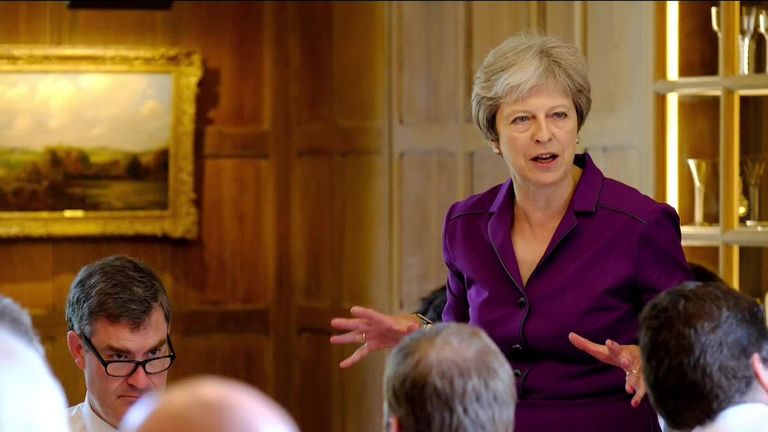In no man's land with no way out: Theresa May's Brexit dilemma
Events of recent days have shown why the PM called a snap election. She needed a big majority to get a Brexit compromise through.
Wednesday 11 July 2018 15:26, UK
For the past couple of years, Theresa May has been criticised for kicking the Brexit can down the road and fudging the hard choices she has to make.
The past couple of days have provided a most fulsome justification of her tactics: setting out her negotiating position has opened the Europe schism in her party, triggered a leadership crisis and left her government facing a Brexit abyss.
And the obvious questions that follow are these: can she survive and, even if she does limp on, can she stitch together any sort of Brexit deal that can satisfy Brussels and get through parliament?
On the issue of survival, the prime minister looks safe - for now.
Number 10 has made it clear she will face down any no confidence vote, and the Brexiteer wing appear to have neither the numbers nor the appetite to depose her.
They are clear that they want to change the Chequers policy not the leader.
The two sides are then in stalemate, with the Brexiteers deploying guerrilla war tactics on No 10 to apply maximum pressure and cause maximum discomfort as they pick and choose different ways to go after her.
Part one of their campaign to kill the Chequers plan is to pressure the prime minister through a stream of resignations from her government.
Two Tory vice-chairman - Ben Bradley and Maria Caulfield - quit yesterday in protest and there are more ministerial resignations being held in reserve.
And if they can't force her out of office, they will try to defenestrate instead.
They have a new nickname for their prime minister: Lino, which stands for Leader In Name Only.
They intend to use her parliamentary weakness to their advantage to defeat her and disrupt government business. "You can't run a parliamentary government if you don't have parliament behind you."
The first taster of this will come next week when the trade and customs bills come to parliament.
The Brexiteers are working out what sort of amendments they can put down that Labour will support in order to scupper Mrs May.
Watch for amendments to curb the so-called "Henry VIII" powers which give government the power to rewrite some laws without consulting parliament. Brexiteers are confident that Labour will support them on this.
But it will be in the autumn when the crisis really hits, for this is when Parliament will have to vote on whatever withdrawal agreement Mrs May cooks up with the EU.
Chequers is already unacceptable to many in her party and that's even before she gives away more concessions as part of her negotiations with Brussels: trying to steer this through Parliament on the back of Tory votes looks an impossible task.
This is why - to the fury of her own backbenchers - her de facto deputy David Lidington briefed Labour on her Chequers plan this week. The government is hoping that enough pro-EU Labour backbenchers will vote with her to avoid the UK crashing out with no deal.
A re-run if you like of 1971, when former Labour chancellor Roy Jenkins led Labour rebels to vote with the Conservative prime minister Ted Heath to help push through the very bill Mrs May is now repealing - the 1972 European Communities Act.
That is a huge gamble and it's far from clear if Mrs May could corral enough pro-EU Labour rebels through her voting lobbies to cancel out the Brexiteers.
If she doesn't we are in real meltdown territory.
The options left would be crashing out with no deal, which parliament will undoubtedly try to block; the collapse of Mrs May's government and another general election; or a broken-backed No 10 asking Brussels for an extension of Article 50, at which point the Conservative party could split.
Faced with that invidious - indeed cataclysmic - set of options, you can see the why Mrs May called that ill-fated snap election.
She needed a decisive majority to ensure that a Brexit compromise would carry in spite of the Remain and Leave extremes in her parliamentary party.
Only a big majority would be able to give her a path through that schism.
Now she's in no man's land with no way out.








